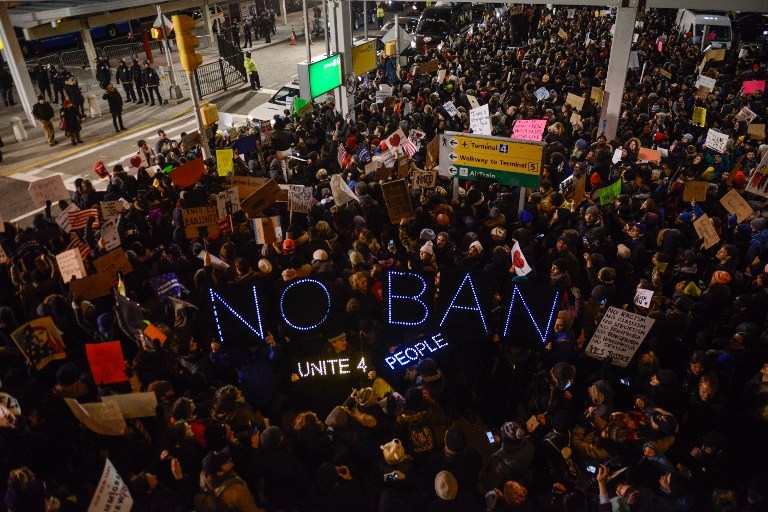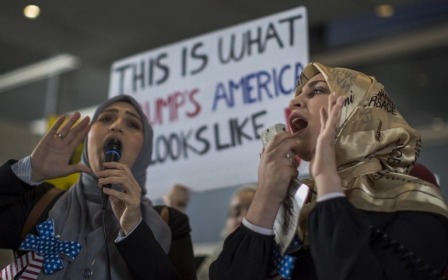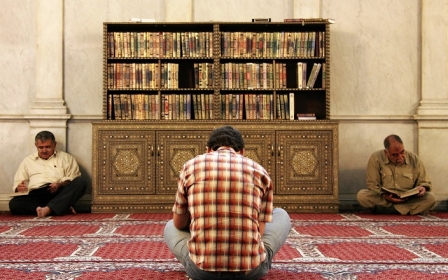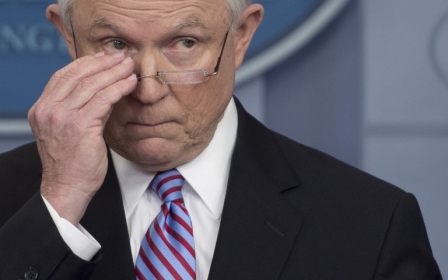You can't compare Trump's Muslim ban to jizya

I normally avoid writing on issues that are potentially subjective and prefer to analyse political realities void of any values.
But when I was asked to write a rebuttal to this opinion piece - The Trump ban? Turning a Muslim system on Muslims – which I found somewhat biased and misinformed, I agreed.
It appears that the article's main theme is that President Trump's "Muslim ban" is actually a taste of Muslims' own medicine, specifically the jizya system of the Islamic caliphates.
It has become too easy to bash Islam and Muslims and, therefore, it is crucial that different perspectives are shared.
Muslim ban versus jizya
Under the US constitution, the country is defined as a secular nation state where there is a separation of state and church. All of its citizens are equal before the law regardless of their religion, colour or gender. Such differences cannot be the premise of any discrimination.
The Muslim ban, which discriminates against Muslims simply as a result of their religion, is unconstitutional and precisely why it was suspended by the federal judiciary system. It does not affect foreigners alone, but also US citizens, permanent residents and those with valid visas. As many Americans say, the ban reflects an attitude which is, at its heart, un-American.
The Muslim ban does not resemble the jizya. It is comparing two very different things from different political systems with different values
The Muslim states of the past, however, were never secular, nor did they claim to be. Furthermore, they did not ban their citizens based on having another religion. The jizya was a flat rate levied on non-Muslims living within Muslim lands. Muslims were already paying the zakah – which was 2.5 percent of a Muslim's annual savings to be redistributed among the poorest and most vulnerable members of society (so long their annual savings was above a certain amount).
The jizya was only levied on non-Muslim male adults who were financially capable; ensuring that they also contributed to the Caliphate. Moreover, non-Muslims were exempted from joining the military and it was the duty of the state to protect them as much as any other citizen.
Non-Muslims were never required to prove their loyalty when the Muslim state was at war with another state or entity that professed their same religion. Thus minorities within Muslim states were insulated from any conflict abroad. In a Muslim state, the primary loyalty was to God and the believers, not to land, nation, ethnicity, tribe or even kin. Such commitment to the Ummah, or the Muslim nation, cannot be expected from those who do not share the belief system of Muslims.
The non-Muslims were indeed required to pay the jizya in the same manner that Muslims were required to pay the zakah. In fact, when some of the Arab tribes refused to pay zakah shortly after the first Calpih Abu Bakr was appointed, he launched war on those tribes compelling them to pay and enforcing the law of the Caliphate.
Clearly, the Muslim ban does not resemble the jizya. It is comparing two very different things from different political systems with different values. Furthermore, one is consistent with professed belief while the other is not.
Muslim ban: a foreign policy failure
On and off, US foreign policy has been dominated by a set of grandiose views on how it should project its power abroad. During the Cold War, the US was primarily interested in preventing the expansion of the Soviet Union. With its collapse, the US became the only superpower in the world, "the end of history" was spoken of and only further democratisation and liberalisation awaited the world.
Since Russia invaded the Crimea in March 2014, the US has not produced a coherent grand strategy based on an assessment of global political realities for how to move forward
Despite how naive it was, the US was supposedly going to spread democracy in Iraq and Afghanistan. The US pushed for liberalisation in Egypt, where at least Mubarak had some competitors running against him in Egypt's 2005 presidential race. Palestine was encouraged to hold elections which took place in 2006. (The US then backed off since the results were not desired). Kuwait, under Western pressure, passed the women political rights bill against the parliament's majority.
Then, the Arab Spring came and the US supported the peaceful protests - only when it was clear that some Arab presidents had to go. It wasn't long before authoritarianism was back again, at times, with US support. The Arab Spring turned into an Arab winter.
Human rights in the Middle East - not to mention political rights - have been dropped from Western mainstream policy discourses. The Middle East that was discussed in terms of democratisation, political participation, institutional reform and the rule of law is now spoken of merely in terms of the "war on terror". With Trump's presidential campaign, the discourse was stretched to include "radical Islam".
After Middle East authoritarianism made a comeback, Obama announced the "Pivot to Asia". China and the South China Sea needed more attention and military resources were to be diverted from the Middle East. To America's surprise, and that of the West at large, however, in March 2014, Russia invaded the Crimea.
Russia was expected to have a special understanding with the West which was no longer the case. Russia now is under economic sanctions, the US has no clear path to deal with its expansionism and no one is talking about the pivot to Asia which will probably go down in history as a casualty of Russia's actions. Since then, the US has not produced a coherent grand strategy based on an assessment of global political realities for how to move forward.
And nothing has changed with Trump's administration. When Zbigniew Brzezinski, the ex-national security adviser and prominent political scientist, was recently asked about Trump's foreign policy, he interrupted his interviewer and said that it was "non-existent".
Red herrings
The Muslim ban comes as a policy which makes the US administration seem firm, decisive and determined to make the US safe. It portrays bravery and boldness in the face of "political correctness". However, in reality, it is a reflection of strategic and foreign policy deficiency. It has sapped so much time and energy from the US public discourse that very few are asking questions that matter about US foreign policy.
Domestically, it has done its damage. The Muslim ban, in its wider context of hateful and discriminatory public sentiment against Muslims, has led to a significant increase in hate crimes against Muslims in the US which have tripled in the past year.
Comparing the Muslim ban to the jizya is fallacious and only feeds into an implicit Islamophobic narrative that Muslims need some sort of punishment for their religion. It deflects attention away from the problematic relations over the course of the past few decades of the US with the Middle East.
Last, but not least, the Muslim ban has deflected attention from developing a solid coherent foreign policy, and the current administration has still not coined one.
- Mustafa Salama is a political analyst, consultant and freelance writer. Salama has extensive experience and an academic background in Middle East Affairs.
The views expressed in this article belong to the author and do not necessarily reflect the editorial policy of Middle East Eye.
Image: Protestors rally during a demonstration against the Muslim immigration ban at John F. Kennedy International Airport on 28 January 2017 in New York City (AFP)
New MEE newsletter: Jerusalem Dispatch
Sign up to get the latest insights and analysis on Israel-Palestine, alongside Turkey Unpacked and other MEE newsletters
Middle East Eye delivers independent and unrivalled coverage and analysis of the Middle East, North Africa and beyond. To learn more about republishing this content and the associated fees, please fill out this form. More about MEE can be found here.





